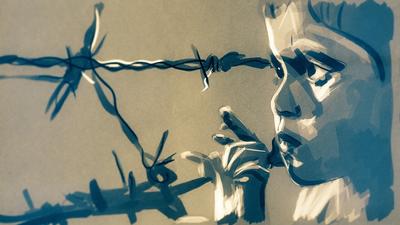Part 1: The Teacher
His wife was still asleep when Mohammed began the short walk to the mosque for dawn prayers.
Stepping inside, he felt the raindrops that had dampened his clothes and skin. His cousin Seif was there too and they exchanged greetings. It was a quiet Friday morning.
As they prayed, they were unaware that soldiers were approaching the village. Around 5.30am Mohammed first heard the sound of machine-gun fire, followed closely by explosions and screams.
"Everyone was running, no-one knew what to do. Should I flee the village? Should I go home to check on my family? It felt like my brain was on fire."
Mohammed and Seif ran for the nearby forest, where Mohammed was suddenly alone – Seif lay on the ground further back – one bullet in his abdomen, another in his head.
Along with several others, Mohammed remained in the forest, huddled under the foliage. They stayed in the forest for a day and a night.
Returning home, Mohammed feared the worst. He had not seen his family in 24 hours.
"Finally I reached my house. I entered to find everyone crying, thinking I was dead. We were so terrified that there was no joy in that instant. It was then that we decided we were going to Bangladesh, where we could be safe. I promised my family I would take care of them. No-one else was going to die there."
Mohammed had been the first member of his family to graduate from university, and he wanted others to have the same opportunity. Before the attacks, he and seven other teachers set up a secondary school in the village. No-one will go to that school now.
Living in a refugee camp in Bangladesh, Mohammed and his family lack basic necessities. Soon his wife will give birth. Mohammed fears for the health and the future of that child.
"She is three months pregnant, but my child will be born here like an animal."
Mohamed and his family survived, but like many others in the camp, they need maternity services and they need them now. Without organisations like Doctors Without Borders, Mohammed and his family will have to fend for themselves once more.
Here's what you can do:
This event is licensed by Islamic Affairs and Charitable Activities Department (License #: 1064).





